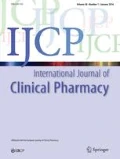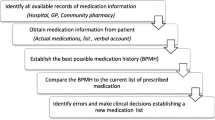Abstract
Medication reconciliation errors occur across transitions in patient care. Of all medication errors in a hospital, 25 % in hospitalised patients are caused by a failure to reconcile new prescriptions with ongoing home treatments. These errors are more common at discharge, but the critical moment for detecting and resolving them is at the time of admission. This commentary reviews the different ways in which reconciliation errors can be prevented. The reconciliation process should be standardised and implemented in daily practice as a routine part of healthcare provision. To achieve this, professional development of hospital pharmacists is of paramount importance. The commentary goes on to describe the factors that affect the reconciliation process and the stages involved in its implementation. Finally, we discuss the use of information technology as a means to help integrating medication reconciliation into clinical practice.


Similar content being viewed by others
References
Kohn LT, Corrigan JM, Donaldson MS (Institute of Medicine). To err is human: Building a safer health system. Washington, DC: National Academy Press; 2000.
Aranaz JM, Aibar C, Vitaller J, Ruiz P. Estudio Nacional sobre los Efectos Adversos ligados a la hospitalización. ENEAS, 2005. Madrid: Ministerio de Sanidad y Consumo; 2006.
American Society of Hospital Pharmacists. ASHP guidelines on preventing medication errors in hospitals. Am J Hosp Pharm. 1993;50:305–14.
Tam VC, Knowles SR, Cornish PL, Fine N, Marchesano R, Etchells EE. Frequency, type and clinical importance of medication history errors at admission to hospital: a systematic review. CMAJ. 2005;173:510–5.
Soler-Giner E, Izuel-Rami M, Villar-Fernández I, Real JM, Carrera P, Rabanaque MJ. Quality of home medication collection in the emergency department: reconciliation discrepancies. Farm Hosp. 2011;35:165–71. Spanish.
Karapinar-Çarkit F, Terry D. Medication reconciliation: a necessity for continuity of care. EJHP Practice. 2011;3:32–3.
Oakes SL, Gillespie SM, Ye Y, Finley M, Russell M, Patel NK, et al. Transitional care of the long-term care patient. Clin Geriatr Med. 2011;27:259–71.
Delgado Sanchez O, Anoz Jimenez L, Serrano Fabia A, Nicolas Pico J, Grupo de Investigacion de la I Beca Joaquim Bonal 2006. [Conciliation in medication]. Med Clin (Barc). 2007;129:343-8. Spanish.
Cornish PL, Knowles SR, Marchesano R, Tam V, Shadowitz S, Juurlink DN, et al. Unintended medication discrepancies at the time of hospital admission. Arch Intern Med. 2005;165:424–9.
Lubowski TJ, Cronin LM, Pavelka RW, Briscoe-Dwyer LA, Briceland LL, Hamilton RA. Effectiveness of a medication reconciliation project conducted by PharmD students. Am J Pharm Educ. 2007;71(5):94.
Pardo MA, Aznar MT, Camacho MD, González M, Martínez M, Pérez MJ, et al. Desarrollo de un programa de conciliación de la medicación: impacto sobre la prescripción médica y resultados en el paciente. El Farmacéutico Hospitales. 2008;192:33–44. Spanish.
Nickerson A, MacKinnon NJ, Roberts N, Saulnier L. Drug-therapy problems, inconsistencies and omissions identified during a medication reconciliation and seamless care service. Healthc Q. 2005;8:65–72. Spec No.
Medication reconciliation in acute care. Getting Started Kit [Internet]. Canada: Safer healthcare now; 2011 [cited 2011 Aug 11]. Available from: http://www.saferhealthcarenow.ca/EN/Interventions/medrec/Pages/default.aspx.
PSG001 technical patient safety solutions for medicines reconciliation on admission of adults to hospital: guidance [Internet]. London: national institute for health and clinical excellence; 2007 [cited 2011 Sept 11]. Available from: http://guidance.nice.org.uk/PSG001/Guidance/pdf/English.
Hospital: 2012 National Patient Safety Goals [Internet]. Washington DC: The Joint Commission; 2012 [cited 2012 Jun 28]. Available from: http://www.jointcommission.org/standards_information/npsgs.aspx.
Steurbaut S, Leemans L, Leysen T, De Baere E, Cornu P, Mets T, et al. Medication history reconciliation by clinical pharmacists in elderly inpatients admitted from home or a nursing home. Ann Pharmacother. 2010;44:1596–603.
De Winter S, Spriet I, Indevuyst C, Vanbradant P, Desruelles D, Sabbe M, et al. Pharmacist- versus physician-acquired medication history: a prospective study at the emergency deparment. Qual Saf Health Care. 2010;19:371–5.
Whittington J, Cohen H. OSF healthcare’s journey in patient safety. Qual Manag Health Care. 2004;13:53–9.
Aguilella T, Canadell L, Martín V, Richart C, García R. Estudio prospectivo de calidad de la conciliación de la medicación crónica en dos servicios hospitalarios. Aten Farm. 2010;12:346–51. Spanish.
Chhabra PT, Rattinger GB, Dutcher SK, Hare ME, Parsons KL, Zuckerman IH. Medication reconciliation during the transition to and from long-term care settings: a systematic review. Res Social Adm Pharm. 2012;8:60–75.
Mueller SK, Sponsler KC, Kripalani S, Schipper JL. Hospital-based medication reconciliation practices. A systematic review. Arch Intern Med [Internet] 2012 Jun [cited 2012 Jun 27]; doi:10.1001/archinternmed.2012.2246. Available from:http://archinte.jamanetwork.com/on 27/06/2012.
Rozich JD, Howard RJ, Justeson JM, Macken PD, Lindsay ME, Resar RK. Standardization as a mechanism to improve safety in health care. Jt Comm J Qual Saf. 2004;30:5–14.
Arora V, Kao J, Lovinger D, Seiden S, Meltzer D. Medication discrepancies in resident sign-outs and their potential to harm. J Gen Intern Med. 2007;22:1751–5.
Grimes TC, Duggan CA, Delaney TP, Graham IM, Conlon KC, Deasy E, et al. Medication details documented on hospital discharge: cross-sectional observational study of factors associated with medication non-reconciliation. Br J Clin Pharmacol. 2011;71:449–57.
Schnipper JL, Liang CL, Hamann C, Karson AS, Palchuk MB, McCarthy PC, et al. Development of a tool within the electronic medical record to facilitate medication reconciliation after hospital discharge. J Am Med Inform Assoc. 2011;18:309–13.
Bassi J, Lau F, Bardal S. Use of information technology in medication reconciliation: a scoping review. Ann Pharmacother. 2010;44:885–97.
Giménez A, Zoni AC, Rodríguez C, Durán-García E, Trovato AN, Pérez C, et al. Developing a programme for medication reconciliation at the time of admission into hospital. Int J Clin Pharm. 2011;33:603–9.
Acknowledgments
The authors would like to thank A.B. Jiménez and F. Martínez for their contribution to the initial planning of this article and A. Giménez for their contribution to the literature search.
Funding
None.
Conflicts of interest
The authors declare that they have no conflicts of interest.
Author information
Authors and Affiliations
Corresponding author
Rights and permissions
About this article
Cite this article
Durán-García, E., Fernandez-Llamazares, C.M. & Calleja-Hernández, M.A. Medication reconciliation: passing phase or real need?. Int J Clin Pharm 34, 797–802 (2012). https://doi.org/10.1007/s11096-012-9707-2
Received:
Accepted:
Published:
Issue Date:
DOI: https://doi.org/10.1007/s11096-012-9707-2




